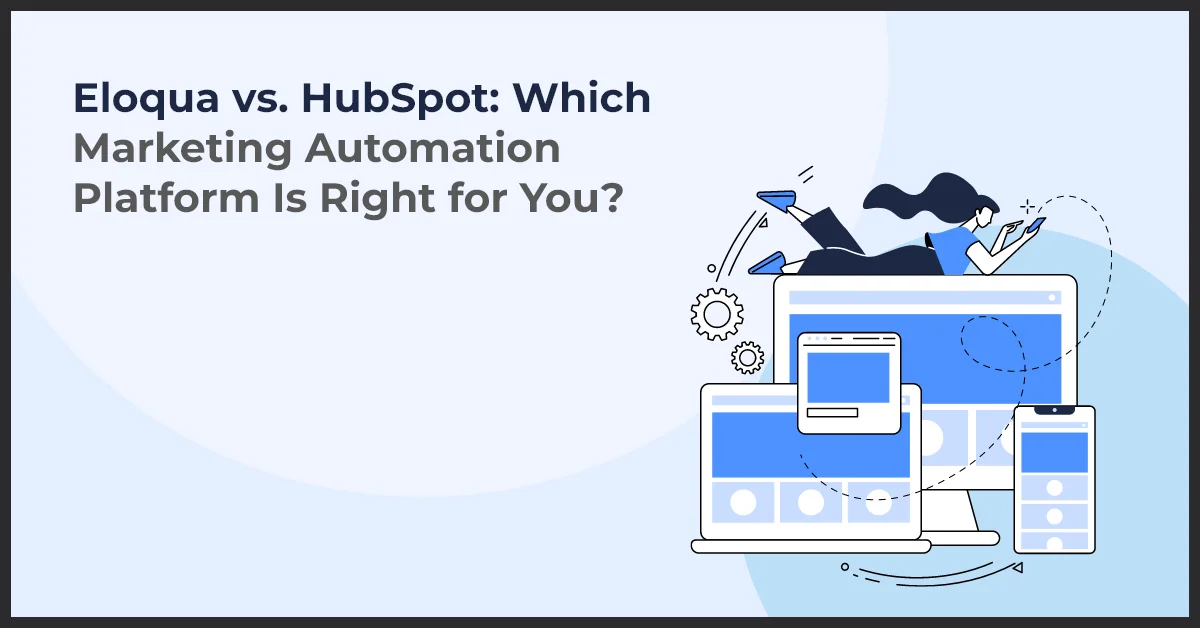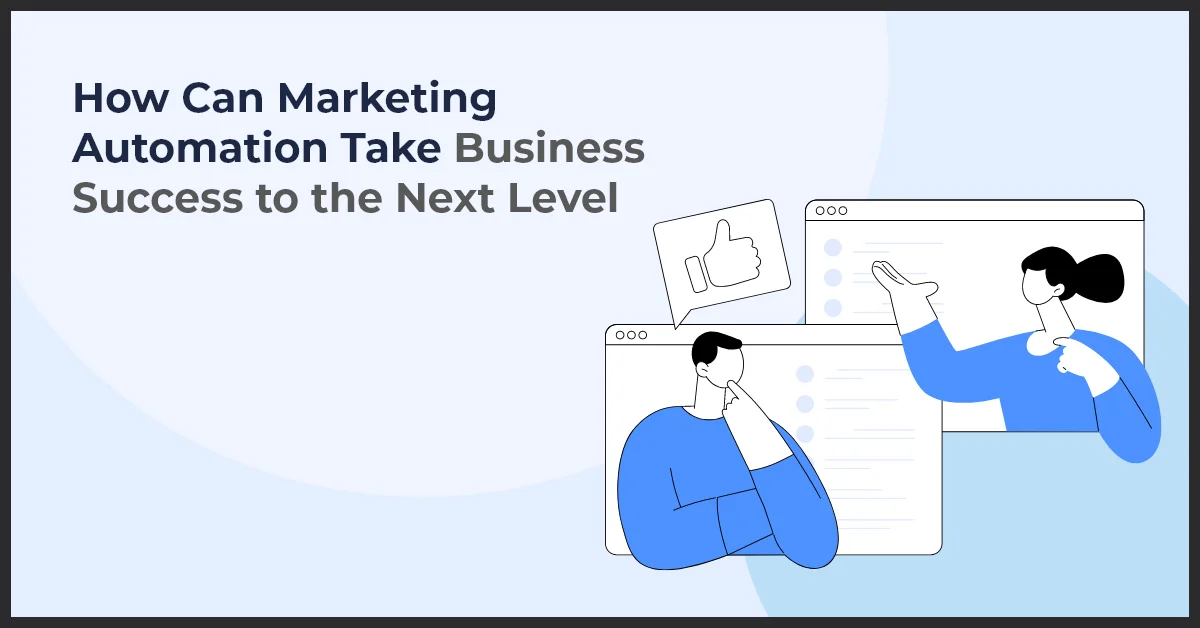Marketing Automation Implementation Services: Streamline Your Marketing Efforts

Published on: December 27, 2023
Updated on: March 11, 2025
2210 Views
- Marketing Automation
12 min read
In today's technology-driven business landscape, marketing automation has become a vital tool for businesses looking to efficiently manage their marketing efforts. By automating repetitive marketing tasks, businesses can save valuable time and resources, while also improving their overall marketing performance.
Definition and Overview of Marketing Automation
Marketing automation refers to the use of software platforms that automate repetitive marketing tasks such as email marketing, social media management, lead nurturing, and campaign tracking. It allows businesses to streamline their marketing efforts, optimize customer interactions, and drive better results.
Importance of Marketing Automation in Today's Business Landscape
With the increasing competitiveness and evolving customer expectations, businesses need to stay ahead of the curve to succeed. Marketing automation enables businesses to scale their marketing efforts, deliver personalized messages to their audience, and align their marketing strategies with customer needs. It empowers companies to effectively nurture leads, build strong customer relationships, and ultimately drive revenue growth.
Benefits of Implementing Marketing Automation Services
Implementing marketing automation services offers several benefits for businesses. Firstly, it saves time by automating repetitive tasks, allowing marketing teams to focus on strategy and innovation. Secondly, it improves lead generation and nurturing through personalized and targeted campaigns, resulting in higher conversion rates. Additionally, marketing automation provides valuable insights and analytics, enabling data-driven decision-making and optimizing marketing strategies for better ROI.
Overall, marketing automation implementation services can revolutionize your marketing efforts, providing you with a competitive edge in today's business landscape. By utilizing the power of automation, businesses can streamline their marketing processes, improve customer engagement, and drive business growth.
Understanding Marketing Automation Implementation Services
Marketing automation implementation services are a critical aspect of streamlining and optimizing marketing processes for businesses. These services involve the strategic planning, setup, configuration, and integration of marketing automation software into existing systems.
1. What are Marketing Automation Implementation Services?
Marketing automation implementation services involve the expert guidance and support in implementing marketing automation technology to streamline and automate marketing tasks. It includes setting up and configuring the software, integrating it with other systems, and creating workflows and campaigns.
2. Role of Service Providers in Marketing Automation Implementation
Service providers play a crucial role in marketing automation implementation. They have the expertise and experience to assess a business's needs, recommend the right software, and oversee the entire implementation process. They ensure that the marketing automation solution aligns with the business goals and effectively integrates with existing systems.
3. Key Considerations for Businesses When Choosing Marketing Automation Implementation Services
- Business Objectives: It is essential for businesses to clearly define their marketing objectives and goals before selecting a service provider. This ensures that the implementation aligns with the desired outcomes.
- Industry Expertise: Businesses should consider service providers who have experience in their industry. They possess valuable insights and understand the unique challenges and opportunities businesses face.
- Integration Capabilities: Choosing a service provider that can seamlessly integrate the marketing automation software with existing systems is crucial. This enables data sharing and facilitates a unified approach to marketing efforts.
- Support and Training: Businesses should prioritize service providers who offer ongoing support and training to their teams. This ensures that staff members are equipped with the necessary skills to utilize the marketing automation software effectively.
Key Topics in Marketing Automation Implementation Services
Marketing automation implementation services encompass various crucial aspects that empower businesses to streamline their marketing strategies effectively. Below are key areas vital in optimizing marketing efforts and driving substantial results:
1. Tailored Marketing Campaigns for Enhanced Strategies
Crafting personalized and targeted campaigns plays a pivotal role in effective marketing strategies. Emphasizing tailored marketing campaigns ensures messages resonate with specific audiences, boosting engagement and conversion rates.
2. Integrating Customer Relationship Management (CRM) for Enhanced Insights
The integration of CRM within marketing automation is paramount. Leveraging CRM data allows for a deeper understanding of customer behavior, enabling personalized and targeted marketing actions that resonate with the audience.
3. Lead Generation and Nurturing Techniques
Implementing robust lead scoring models aids in identifying high-potential leads. Furthermore, employing automated lead nurturing campaigns streamlines the nurturing process, ensuring a more efficient and effective lead management system.
4. Revamping Email Marketing Strategies
Enhancing email marketing efforts involves designing compelling email templates, setting up automated workflows for timely responses, segmenting mailing lists for personalized content delivery, and closely analyzing email performance metrics for continual improvement.
5. Advanced Analytics and Reporting
The use of analytics tools is vital for tracking and evaluating marketing performance metrics. Generating comprehensive reports and leveraging data insights facilitate informed decision-making, allowing for ongoing optimization of marketing strategies.
6. Expanding Reach through Multi-Channel Marketing
Integrating marketing efforts across various channels, including social media, personalized website experiences, mobile marketing strategies, and seamless integration with other channels, helps businesses reach a wider audience effectively.
7. Seamless Marketing Technology Stack Integration
Efficiently implementing marketing automation software and ensuring seamless integration with existing CRM and email marketing tools is critical. Compatibility with other marketing platforms fosters a cohesive ecosystem for streamlined operations.
8. Workflow and Process Optimization for Efficiency
Mapping customer journeys and streamlining campaign creation processes via automated workflows are essential for optimizing efficiency within marketing automation. This approach helps in delivering timely and relevant content to the audience.
Embracing these key aspects within marketing automation implementation services enables businesses to refine their marketing strategies, improve customer engagement, and drive tangible results.
How Marketing Automation Implementation Services Can Improve Sales and Business Performance
Implementing marketing automation services can have a profound impact on sales and overall business performance. By leveraging the power of automation, businesses can streamline their marketing and sales efforts, enhance lead scoring and qualification, improve customer engagement and relationship building, and increase efficiency and productivity in marketing operations.
1. Streamlining Marketing and Sales Alignment
One of the key benefits of marketing automation implementation services is their ability to streamline the alignment between marketing and sales teams. With automation, businesses can ensure that marketing strategies and messaging are effectively communicated to the sales team, enabling them to tailor their approach to individual prospects and ultimately close more deals.
2. Enhancing Lead Scoring and Qualification
With marketing automation, businesses can implement sophisticated lead scoring and qualification processes. By tracking and analyzing prospect behavior, businesses can assign a lead score based on their level of engagement and readiness to purchase. This allows sales teams to prioritize their efforts and focus on leads that are most likely to convert, resulting in higher conversion rates and increased sales.
3. Improving Customer Engagement and Relationship Building
Marketing automation implementation services can also greatly improve customer engagement and relationship building. By automating personalized communication and nurturing campaigns, businesses can provide tailored content and offers to prospects and customers at every stage of the buyer's journey. This not only fosters stronger relationships but also increases the likelihood of repeat purchases and customer loyalty.
4. Increasing Efficiency and Productivity in Marketing Operations
Another significant advantage of marketing automation is its ability to increase efficiency and productivity in marketing operations. By automating repetitive tasks such as email marketing, lead nurturing, and data analysis, businesses can free up valuable time for their marketing teams to focus on strategic initiatives. This not only saves time and resources but also allows for more effective campaign planning and execution.
Choosing the Right Marketing Automation Consultancy
Implementing marketing automation can be a game-changer for businesses, allowing them to streamline their marketing processes, nurture leads, and improve overall efficiency. However, choosing the right marketing automation consultancy is crucial to ensure a smooth and successful implementation. Here are some factors to consider when selecting a marketing automation service provider:
1. Factors to Consider When Selecting a Marketing Automation Service Provider:
- Expertise: Look for a consultancy that specializes in marketing automation implementation. They should have a team of experts who are knowledgeable about different marketing automation platforms and can provide tailored solutions to meet your specific business needs.
- Experience: Consider the consultancy's experience in implementing marketing automation for businesses in your industry or similar industries. A consultancy that has successfully implemented marketing automation for similar businesses will have a better understanding of the challenges and solutions specific to your industry.
- Integration Capabilities: Ensure that the consultancy has experience in integrating marketing automation platforms with your existing systems, such as CRM software. Effective integration is vital to ensure a seamless flow of data and maximize the benefits of marketing automation.
- Training and Support: Look for a consultancy that offers comprehensive training and ongoing support for your team. They should provide training sessions to familiarize your team with the marketing automation platform and offer support throughout the implementation and beyond.
- Customization: Consider whether the consultancy can customize the marketing automation platform to suit your unique business requirements. A one-size-fits-all approach may not fully address your specific needs, so ensure the consultancy is capable of tailoring the platform to your business processes.
2. Case Studies: Successful Marketing Automation Implementation Services
Before making a decision, it is beneficial to review case studies of previous successful marketing automation implementations handled by the consultancy. Case studies can provide insights into the consultancy's capabilities, approach, and the results they have achieved for their clients. Look for case studies that are relevant to your industry or business size to ensure a good fit.
Choosing the right marketing automation consultancy is key to a successful implementation. Consider these factors and review case studies to make an informed decision. With the right consultancy by your side, you can unlock the full potential of marketing automation and propel your business towards greater success.
The Future of Marketing Automation and Its Impact on Business Success
The future of marketing automation looks promising and its impact on business success cannot be understated. As technology continues to advance and customer expectations evolve, companies will increasingly rely on marketing automation to achieve their goals.
Marketing automation implementation services enable businesses to streamline their marketing processes, improve efficiency, and drive better results. By automating repetitive tasks, such as email campaigns and lead nurturing, companies can save time and resources while delivering targeted and timely messages to their customers.
One of the key advantages of marketing automation is its ability to personalize and segment communication. Through data analysis and customer insights, businesses can create highly targeted campaigns that resonate with individual customers. This level of personalized communication not only improves customer experience but also increases the likelihood of conversion and repeat business.
Moreover, marketing automation empowers businesses to track and measure the effectiveness of their campaigns. With robust analytics and reporting tools, companies can gain valuable insights into their marketing efforts, identify areas for improvement, and make data-driven decisions to optimize their strategies.
Looking ahead, the future of marketing automation will likely see advancements in artificial intelligence and machine learning. These technologies will further enhance personalization and segmentation, enabling businesses to deliver even more relevant and tailored marketing messages. Additionally, automation will extend beyond traditional marketing channels, such as email and social media, and encompass other touchpoints in the customer journey.
The impact of marketing automation on business success is undeniable. Companies that embrace marketing automation and implement it effectively will have a competitive edge in the digital landscape. They will be able to deliver personalized experiences, engage customers at every touchpoint, and ultimately drive revenue growth.
How We Approach Marketing Automation Consulting
At Growth Natives, our marketing automation consulting services are designed to help businesses streamline workflows, optimize customer engagement, and drive revenue growth. Our approach is built on four key pillars:
1. Understanding Your Business Goals
We begin by assessing your current marketing strategies and identifying opportunities where marketing automation software services can drive better results. Our experts:
- Analyze your sales funnel and customer journey.
- Identify gaps in lead nurturing and engagement.
- Develop a customized automation roadmap tailored to your business needs.
2. Selecting and Implementing the Right Automation Tools
Choosing the best marketing automation software is crucial for success. We guide you through:
- Selecting a platform that aligns with your business goals (e.g., Marketo, Pardot, HubSpot, ActiveCampaign).
- Setting up automation workflows for email marketing, lead nurturing, and campaign tracking.
- Ensuring seamless integration with your CRM and sales tools.
3. Customizing Workflows for Maximum Efficiency
Every business is unique, and so should be your automation strategy. Our team:
- Designs automated lead scoring and segmentation to enhance personalization.
- Implements multi-channel automation across email, social media, and paid ads.
- Sets up A/B testing to refine marketing efforts.
4. Training and Ongoing Support
We don’t just set up automation; we empower your team to leverage it effectively. Our consultants:
- Provide hands-on training on using marketing automation platforms.
- Offer continuous monitoring and optimization to improve results.
- Help troubleshoot any technical or performance issues.
Marketing Goals Empowered via Marketing Automation
With marketing automation consulting services, businesses can achieve:
- Higher Lead Conversion Rates – Automate lead nurturing and follow-ups to move prospects through the funnel faster.
- Better Customer Engagement – Use personalized campaigns based on user behavior and preferences.
- Time and Cost Savings – Reduce manual marketing tasks and free up resources for strategy and growth.
- Data-Driven Decision Making – Track campaign performance and refine strategies using real-time analytics.
Let’s Discuss Your Marketing Automation Needs
Every business has unique challenges, and our goal is to help you make the most of your marketing automation investment. Whether you’re new to automation or looking to optimize an existing setup, our team is here to help.
- Do you need help choosing the right automation platform?
- Are you struggling with low engagement or lead conversion rates?
- Do you want to integrate marketing automation with your existing CRM?
If yes, let’s discuss how we can help!
How We Can Help You Do Better with Marketing Automation
At Growth Natives, we provide end-to-end marketing automation software services to help businesses:
- Identify the best automation strategies tailored to their goals.
- Implement and optimize marketing automation tools for better efficiency.
- Train teams to maximize automation benefits and improve ROI.
Our expert consultants will work closely with you to drive meaningful results and sustainable growth.
Conclusion
Marketing automation implementation services are crucial for businesses seeking to stay ahead in a rapidly evolving digital landscape. By adopting marketing automation, companies can improve their efficiency, increase personalization, and achieve better business outcomes. With the future of marketing automation looking promising, businesses should embrace this technology to drive their success.
Frequently Asked Questions
These services typically start with an assessment of your marketing needs and goals, followed by the selection and setup of a suitable marketing automation platform. The process includes integrating the platform with existing systems, customizing workflows and campaigns, training your team, and providing ongoing support and optimization.
Understand the importance of marketing automation implementation services for businesses, including the ability to save time, improve efficiency, scale marketing efforts, personalize customer interactions, and drive revenue growth through automation.
Understand the typical steps in marketing automation implementation, such as needs assessment, platform selection, system configuration, integration with other tools, data migration, campaign setup, testing, and training.
Common challenges include selecting the right platform, integrating with existing systems, data migration, customization complexity, and ensuring user adoption. Working with experienced implementation service providers can help mitigate these challenges and ensure a smooth transition.
Explore the key performance indicators (KPIs) and metrics to track the success of your marketing automation implementation, such as lead generation, conversion rates, customer engagement, campaign performance, and ROI.



